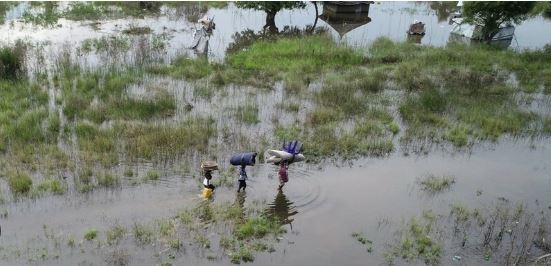As the High-Level Political Forum for Sustainable Development 2024 unfolds in New York, Médecins Sans Frontières (MSF) has issued a dire warning about looming severe floods in South Sudan. Ranked seventh globally in vulnerability to river floods, South Sudan faces heightened risks exacerbated by predictions of above-normal rainfall and significant water releases from Lake Victoria.
These floods are anticipated to devastate communities already grappling with food insecurity, compromised access to clean water, sanitation, and hygiene facilities, and escalating health threats. Over 5.4 million people are expected to be affected by floods in 2024, with rains anticipated to intensify from July to October.
“The predicted increase in rainfall in 2024 is very concerning given the number of people at risk in flood-prone areas, threats to water, sanitation, and hygiene, and the risk of water- and vector-borne disease transmission, particularly in internally displaced people’s camps or transit centers where people are living in overcrowded conditions with limited access to livelihoods,” said Joe Aumuller, MSF Epidemiologist Activity Manager.
Refugees and returnees from Sudan, now numbering over 740,000, are joining nearly two million internally displaced people (IDPs). Access to health, nutrition, water, sanitation, and hygiene (WASH) services is becoming increasingly difficult due to drastic cuts to aid budgets and significant underfunding for the humanitarian response.
In Bentiu town’s IDP camps, a nutritional screening by the Rubkona County Health Department in June 2024 found alarming rates of malnutrition among children under five. Nearly 19% were acutely malnourished, with 6% suffering from severe acute malnutrition (SAM). This exceeds the critical threshold of 14.1% for Global Acute Malnutrition (GAM), indicating a severe nutritional crisis exacerbated by recent flooding.
This is a significant threat to children’s lives and their long-term health and development. Malnourished children under five have impaired immunity and are most at risk of life-threatening diarrhea.
During the floods of 2021 and 2022, MSF observed a significant increase in diarrhea cases among children under five at Bentiu’s IDP camp. Cases rose from 2,300 in 2020 to an average of 5,200 in 2021 and 2022, declining to 2,400 in 2023 as flooding subsided. Stagnant floodwater also increases the risk of malaria, the primary cause of illness and death in young children.
The expected severe flooding will likely cause further displacement, crop and livestock losses, aid disruptions, and increased disease outbreaks such as Hepatitis E, which has become endemic in some areas of South Sudan.
MSF calls on leaders and humanitarian organizations to take immediate action to protect people from the devastating effects of floods by developing flood-resistant water, health, and education systems in South Sudan.
“It is very clear South Sudan needs support to cope with extreme flooding and further consequences of climate change. Let’s hope that the High-Level Political Forum for Sustainable Development talks will help make this a reality for South Sudan, or the cost in human lives will continue to rise,” said Ibrahim Muhammad, MSF’s Head of Mission in South Sudan.




